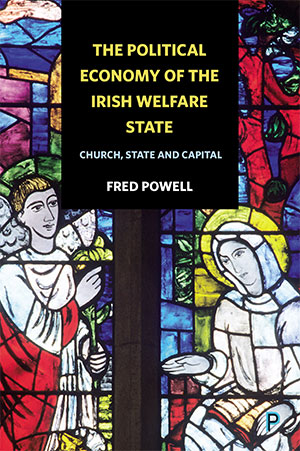The political economy of the Irish welfare state: Church, State and capital
Published in Book Reviews, Book Reviews, Issue 1 (January/February 2018), Reviews, Volume 26FRED POWELL
Policy Press
£64
ISBN: 9781447332916
Reviewed by Bartholomew Begley
Bartholomew Begley is an Irish Research Council Government of Ireland postdoctoral fellow in Philosophy at Dublin City University.

Fred Powellhas set himself the formidable,multi-facetedand laudable task of analysing the real rationale behind Ireland’s current welfare regime, describing the cultural and political path that got us here, and placing all this within a general philosophy of welfare. The order of presentation in the book, however,runs in the opposite direction: philosophy of welfare, then historical path, then current rationale, which muddies Powell’s argument somewhat and makes for a book that one might better read backwards.
The book hits its stride in the penultimate Chapter 8, ‘The marketisation of the welfare state’, for it is here that topics mentioned elsewhere, like ‘welfare productivism’, ‘the developmental welfare state’ and ‘the competition state’ finally find their role within a clear rebuke of Ireland’s version of ‘social partnership’. Powell’s writing here is clear and his passion obvious.
Chapters 2–7 are a roughly chronological run-through of how social culture in Ireland interacted with government decisions on welfare, from pre-1922 nationalism and its smothering of social movements to gay marriage. The chapters track Ireland’s progress into a secular urban society, against the forces of reaction (basically the Church and all things rural), and how those changes have influenced the welfare state. Each chapter is divided into short subsections on discrete issues in social culture or politics.
The first chapter, ‘Why the welfare state matters’, is intended as a general philosophy of the welfare state, its origins and purposes. Had it been the last chapter of the book, earlier chapters would have informed it, but as it stands it is too allusive.Nevertheless, the author’s tribulations here are forgivable, given the absence, oft remarked upon elsewhere, of almost any philosophical discussion in or of Irish public life. So scholars like Powell have to do it from scratch.
Whatever direction one reads in, however, it is not obvious here that our current welfare paradigm really is a product, ideologically at least, of our cultural path to date. The forces that Powell sees at play now do not seem to be those of heretofore.
The ‘Church–State alliance’ looms large in the book. That the Church was a powerful force noone will deny, and Powell is right to highlight itsongoing involvement in education and health, but the case for an ‘alliance’ on policy is not so clear. Aside from occasions like the divorce referenda, when Church and State seem more in collision than in cahoots, the one instance that is continually referred to is the infamous ‘Mother and Child Scheme’ débâcle of 1950–1. Church manipulation of the organs of the state is otherwise not clearly demonstrated but rather taken as read, with reference always back to 1951. Powell calls the ensuing popular dismay at the level of Church influence a watershed, since it weakened subsequent Church power over policy. Despite this,however, in 1956the VHI wasintroduced, copper-fastening the two-tier health system, and there followedever more state retrenchment from healthcare in the succeeding years. A vague case is ultimately made for modern ‘social partnership’ as a continuation of Church-centred corporatism, but even Powelladmits that the comparison is flawed. In the final chapters on the current situation the Church has dropped out, barring the work of some sociallycommitted religious.
Capital takes centre stage in those final chapters, where ‘social partnership’ is recognised as not entailing inclusive democracy but as neo-liberalism with a corporatist façade, prioritising competitiveness over social cohesion and welfare. In the preceding chapters, however, capital plays little role. Michelle Norris’s work on a ‘property-based welfare state’ is often referenced but never explored, perhaps because Norris is not as convinced as Powell seems to be of its socially regressive nature. Fianna Fáil’s land-speculation corruption gets a brief lambasting.
In merging culture, politics and philosophy, the latter two lose out. To cite a few examples, more was needed on the 1918 election which Labour chose not to contest—a very costly decision, Powell admits, in terms of Ireland’s developmental path. Equally, there is discussion of the unwillingness of governments to measure poverty in relative termsor to adopt a structural understanding of poverty, but never how these two positions inform one another.Finally, though he discusses the idealisation of ‘development’,Powell seemsunaware of how his own sense of ‘modernisation’ shifts completely from good,secularising progress to harmful neo-liberalism.
As a study of modern welfare, there is not enough detail on who gains, who pays and what’s the real effect. There are none of the tables of social quintiles, wage-share percentages and households in povertythat adorn most studies of this kind. This was undoubtedly a conscious decision, to aid readability, but it means that we come away with a picture informed more by ideological argument than by knowledge of realities and causes, or of methods and outcomes. This, however, is the author’s point: that Ireland needs to reconsider not just the figures but also what welfare is for.
Equally, there is not muchnew research in the book. The history has been covered elsewhere, e.g. by Tom Bartlett, Diarmuid Ferriter or J.H. Whyte,and many of the current-day concerns have beendiscussedby Mairéid Considine, Fiona Dukelow, Peadar Kirby or Mary Murphy, inter alia.New research, however, was not the book’s aim. It triesrather to bring the two areas together and to articulate the philosophy around them. The execution is flawed but the goal is spot on.
















